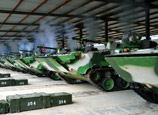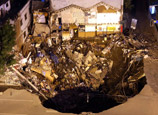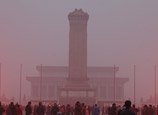
 |
| Gold foil paste applied to monk's head. (Photo/China Daily) |
Restoration only receives about 5 percent of the operating expenses of a museum and nearly half of museums across the country do not have a crew of professional full-time restoration technicians, according to Song Xinchao, vice-director of the State Administration of Cultural Heritage.
Before 2000, the Capital Museum had only four restoration technicians. Today, there are 40. Nationwide there are around 2,000 at 3,415 museums, both private and public, according to the administration.
But among the 2,000 technicians only 300 or 500 can actually do restoration and conservation work, said Zhan Changfa, the director of the restoration and training center at the Chinese Academy of Cultural Heritage. "There are not that many in the frontline of the profession."
The central government has said it will invest 12 billion yuan ($1.89 billion) on restoring and conserving the nation's cultural relics in 2012, according to Zhan. "But even if the government has the will to spend the money, few museums or cultural organizations can do restoration projects, because there is a lack of people that are capable of doing the work."
Few young people choose restoration work as a profession as it is not a glamorous or high profile career. Restoring a cultural relic attracts less attention than publishing a research paper, said Zhan.
"It's not very often that young people choose restoration work as their first job, never mind as a lifelong career. Every year, about one-third of graduates from the related departments choose other walks of life."
For love not money
The smell of old paper and fermented-flour glue floats in the air of the corridor leading to the painting restoration department on the seventh floor of the Capital Museum.
Five or six young people stand in a room smaller than a volleyball court. Lou Pengzhu, senior master and director of painting restoration at the Capital Museum, sits watching them working.
"Personal interest is the most important thing in this profession," she said. "Young talent with high degrees don't want to do jobs like this,"
Although some young people have great potential there are not enough funds to recruit them officially, which means they can only earn a little more than 1,000 yuan a month as "unofficial employees", according to Lou.
"All of her 14 fellow students intend to work in either private museums or specialist workshops offering restoration services. Restoration work consumes a great deal of time and energy," said Zhang Zhaoxin, an intern at the Capital Museum.
"There are many areas that need to be studied, such as chemistry and the usage of materials. But I do it because I love the work."
For love not money
The smell of old paper and fermented-flour glue floats in the air of the corridor leading to the painting restoration department on the seventh floor of the Capital Museum.
Five or six young people stand in a room smaller than a volleyball court. Lou Pengzhu, senior master and director of painting restoration at the Capital Museum, sits watching them working.
"Personal interest is the most important thing in this profession," she said. "Young talent with high degrees don't want to do jobs like this,"
Although some young people have great potential there are not enough funds to recruit them officially, which means they can only earn a little more than 1,000 yuan a month as "unofficial employees", according to Lou.
"All of her 14 fellow students intend to work in either private museums or specialist workshops offering restoration services. Restoration work consumes a great deal of time and energy," said Zhang Zhaoxin, an intern at the Capital Museum.
"There are many areas that need to be studied, such as chemistry and the usage of materials. But I do it because I love the work."
Modern conservation
Liu Yuming recalled how delicate and detailed the repair work used to be and the skills of the older generation of craftsmen.
"Now some of our skills seem to have fallen behind other regions," he said.
Traditionally, the skills would have been passed on from the master to the disciple, and for the disciple to become a master craftsman in turn would have required years of experience.
Today's restoration technicians have the help of machines so they don't have to learn through the techniques and skills to the same extent.
"Machines can do better job in grinding the gold foil into even finer gold powder which can make the gold mud glow really beautiful," said Liu.
Restoration work is even becoming high-tech. The Capital Museum, for example, has started employing nanotechnology in a bid to make the restorations last longer.
"But there is still a gap between high technology development and pragmatic use," said Ma Yan, a member of the museum's painting restoration department

















 Buildings collapse after subsidence in S China
Buildings collapse after subsidence in S China


![]()
